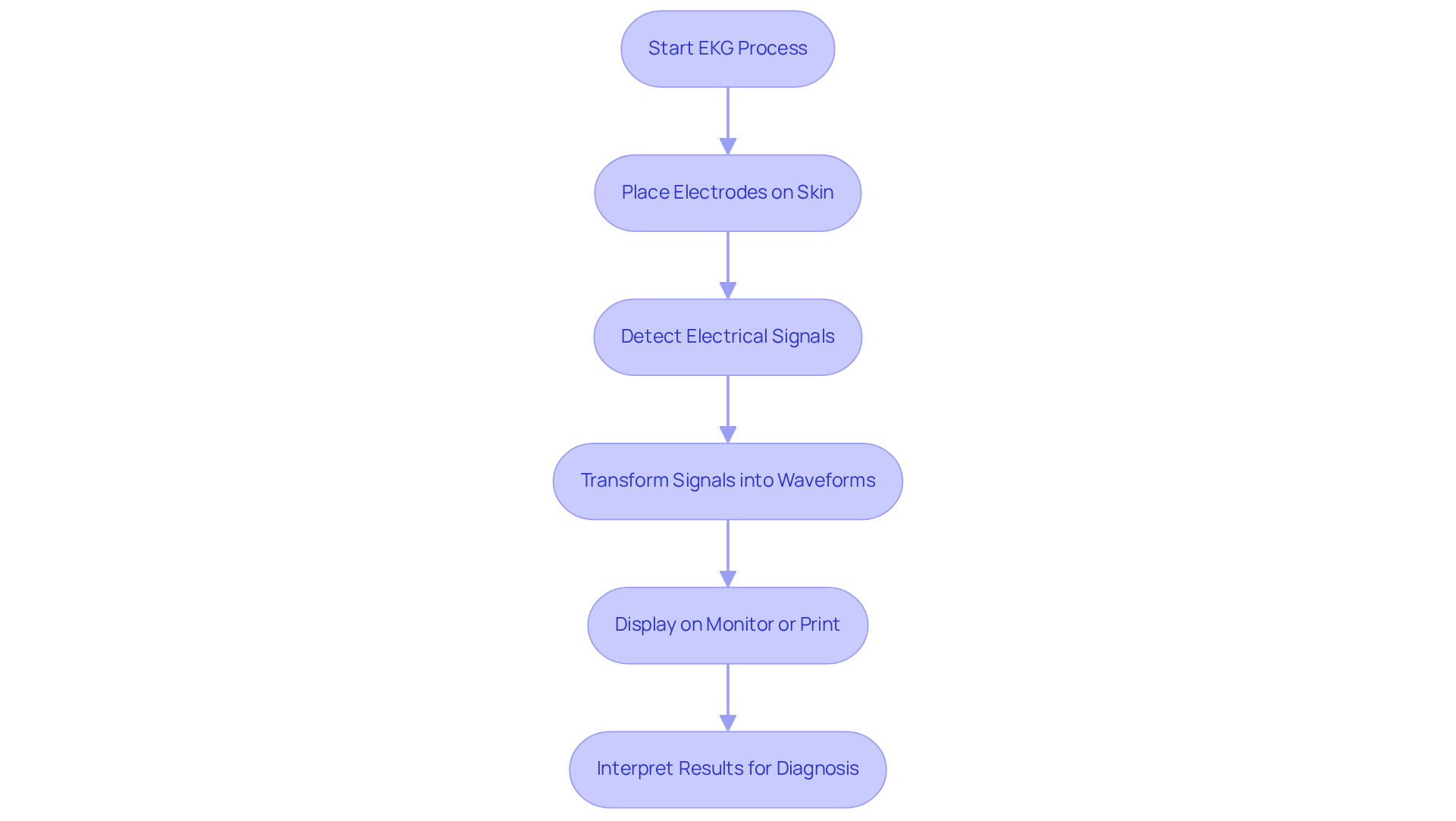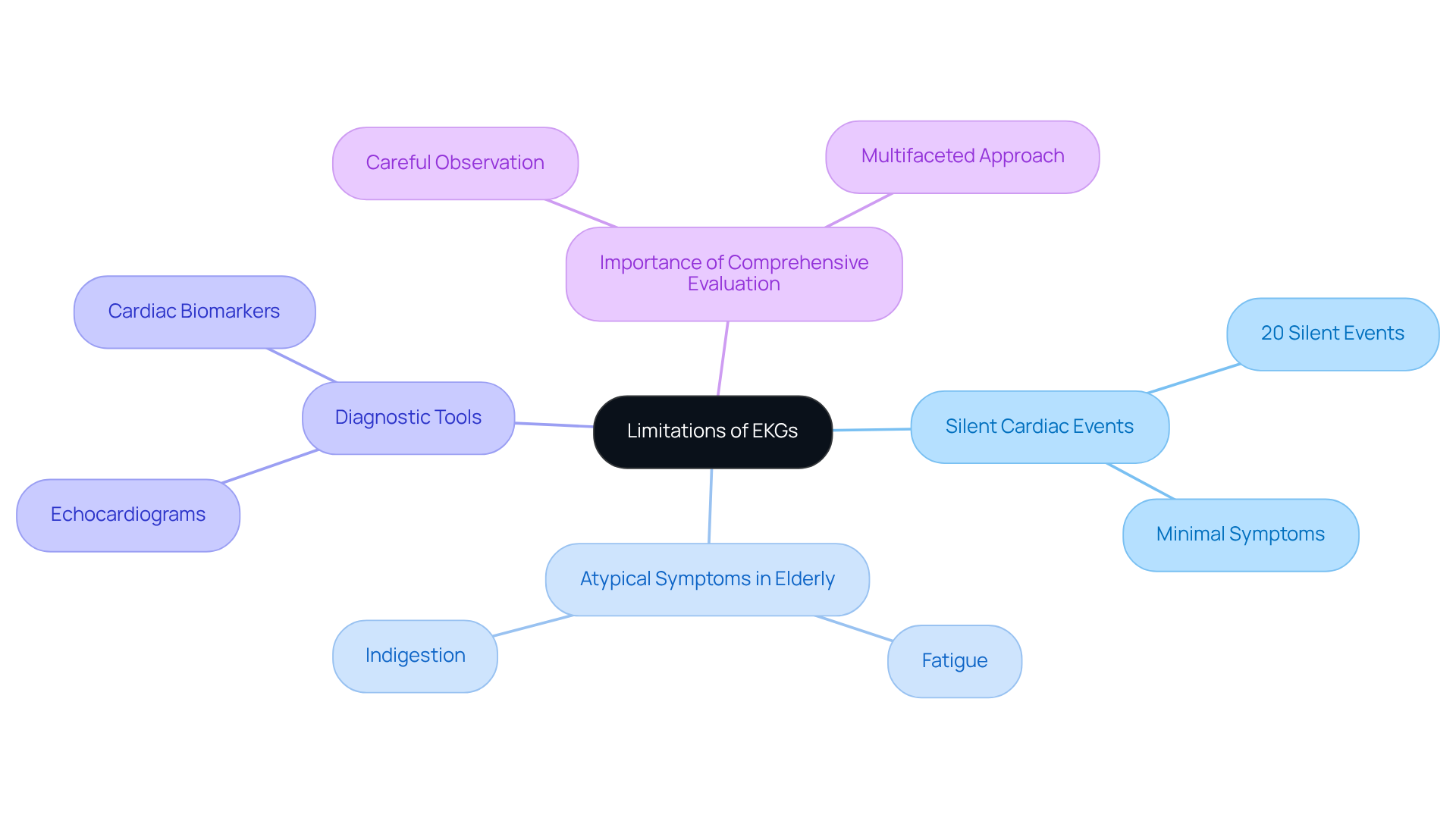


Electrocardiograms (EKGs) are essential tools in assessing heart attack risk, as they help identify irregular heart rhythms and signs of ischemia, which indicate restricted blood flow to the heart.
Have you ever wondered how these tests can impact your health? It’s important to know that specific changes in EKG waveforms during cardiac events can guide healthcare providers in making urgent treatment decisions. This highlights the critical role of prompt EKG analysis in improving patient outcomes.
Remember, understanding your heart health can empower you to take charge of your well-being. If you have concerns about your heart, don’t hesitate to reach out for support. You are not alone in this journey.
Understanding the intricacies of heart health is crucial, especially in a world where cardiovascular diseases are a leading cause of mortality. Electrocardiograms (EKGs) play a vital role in assessing heart attack risk by capturing the heart's electrical activity and identifying potential abnormalities.
However, you may wonder: can these tests truly predict the likelihood of a heart attack, or do their limitations overshadow their benefits?
This article gently explores the capabilities and constraints of EKGs in heart attack detection, highlighting their significance in clinical settings while also considering alternative diagnostic tools available for a comprehensive cardiac assessment.
Your heart health matters, and we are here to guide you through understanding these important assessments.
An electrocardiogram (EKG or ECG) is a vital medical test that records the electrical activity of your heart over time. It provides essential insights into your heart's rhythm, size, and position, as well as any potential damage to the cardiac muscle. This test is performed by placing electrodes on your skin, which detect the electrical signals produced by your heart. These signals are then transformed into waveforms that you can see on a monitor or printed on paper.
Understanding electrocardiograms is crucial for determining if a heart attack can be identified, along with recognizing various heart issues, such as arrhythmias and other cardiovascular irregularities. The ability to interpret these waveforms is an important skill for healthcare providers, especially in emergency situations where prompt assessment is necessary.
If you have concerns about your heart health, reaching out for support and understanding is always a good step.

Electrocardiograms are essential for assessing the risk of cardiac events and can EKG determine heart attack by helping to identify irregular rhythms and signs of ischemia, which indicates restricted blood flow to the heart muscle. When a cardiac event occurs, the heart muscle can sustain damage, leading to specific changes in the EKG waveform, which raises the question of how can EKG determine heart attack. These changes are essential for healthcare providers to determine the urgency of necessary interventions. Have you ever wondered how quickly EKG interpretation can impact treatment? Research shows that rapid interpretation in emergency situations can lead to immediate actions, like administering thrombolytics to dissolve clots or preparing for surgical procedures.
In a recent community study, it was found that electrocardiogram abnormalities were present in 31.3% of participants, illustrating how can EKG determine heart attack through early detection and management. Furthermore, the predictive power of EKG features has been validated, showcasing their effectiveness in risk stratification. With Amavita's CardioElite™ program, the role of electrocardiograms is further enhanced. This program acts as a clinical force multiplier by integrating advanced diagnostic data and providing 24/7 cardiology consultation. It specifically addresses high rates of cardiovascular readmission, offering proactive patient management and improving outcomes for those at high risk.
Cardiologists emphasize that prompt electrocardiogram analysis can help determine heart attack and, when combined with comprehensive cardiovascular care, can significantly enhance patient outcomes. This underscores the essential role that electrocardiograms play in the fight against cardiovascular disease. Remember, you are not alone in this journey; support and understanding are always within reach.

While EKGs are valuable instruments for diagnosing existing cardiac conditions, it’s important to recognize that although they can EKG determine heart attack, their effectiveness in identifying prior myocardial incidents can sometimes be limited. Changes from previous myocardial infarctions may not be visible on an EKG, especially if the heart has healed or if the patient has underlying conditions that mask these changes. Did you know that approximately 20% of cardiac events are silent? These often present with minimal or unusual symptoms, which can complicate the interpretation of whether an EKG can determine a heart attack. For instance, elderly patients might experience symptoms like fatigue or indigestion instead of the classic chest pain, making diagnosis more challenging.
Cardiologists emphasize that these atypical presentations require careful evaluation, especially when considering how can EKG determine heart attack. This is why healthcare providers often explore if an EKG can determine heart attack alongside using other diagnostic tools, such as echocardiograms and cardiac biomarkers. By doing so, they can develop a comprehensive understanding of a patient’s cardiac history. This multifaceted approach is particularly vital for elderly populations, where cardiovascular issues may manifest in unexpected ways. It highlights the importance of careful observation and evaluation, ensuring that every patient receives the attention and care they deserve.
If you or a loved one are experiencing any unusual symptoms, please don’t hesitate to reach out for support. Your health is important, and there are compassionate professionals ready to help you navigate these concerns.

When it comes to understanding your heart health, various examinations can help to assess if an EKG can determine heart attack and identify potential cardiac events. For instance, echocardiograms use ultrasound waves to create images of your heart's structure and function, while cardiac stress tests evaluate how your heart performs under physical stress. It’s important to know that cardiac biomarkers, like troponin levels, are also vital in diagnosing heart attacks, as they can indicate damage to the heart muscle.
Furthermore, advanced imaging techniques, such as coronary angiography and cardiac MRI, provide detailed insights into the health of your coronary arteries, revealing any blockages or abnormalities that may need attention. By utilizing a combination of these tests, healthcare providers can offer a more accurate diagnosis tailored to your individual needs, especially if you have a complex medical history.
Remember, it's completely normal to feel anxious about these tests, but rest assured that each step is taken with your well-being in mind. Your healthcare team is here to support you and ensure that you receive the best possible care.

Electrocardiograms (EKGs) play an essential role in evaluating heart attack risk, providing vital insights into the heart's electrical activity and potential concerns. Their capacity to identify irregular rhythms and signs of ischemia makes them invaluable for timely diagnosis and intervention. By understanding how EKGs function and their significance in cardiovascular health, individuals can feel empowered to take proactive steps in managing their heart well-being.
Throughout this article, we have gently explored various aspects of EKGs, including their diagnostic capabilities, the limitations in recognizing past heart attacks, and the importance of combining them with other diagnostic tools. The effectiveness of EKGs shines through their predictive power in emergencies, where rapid interpretation can lead to immediate, life-saving actions. Furthermore, advancements like Amavita's CardioElite™ program underscore the evolving landscape of cardiovascular care, highlighting the necessity for comprehensive management strategies.
Ultimately, acknowledging the importance of EKGs in heart health is crucial for both patients and healthcare providers. As cardiovascular diseases continue to pose a significant threat, staying informed about the available tools for early detection and intervention can truly make a difference. We encourage individuals to engage with their healthcare teams, seek support, and explore the full range of diagnostic options to ensure optimal heart health and overall well-being.
What is an electrocardiogram (EKG or ECG)?
An electrocardiogram (EKG or ECG) is a medical test that records the electrical activity of the heart over time, providing insights into the heart's rhythm, size, position, and potential damage to the cardiac muscle.
How is an EKG performed?
An EKG is performed by placing electrodes on the skin, which detect the electrical signals produced by the heart. These signals are then transformed into waveforms displayed on a monitor or printed on paper.
Why is understanding EKGs important?
Understanding EKGs is crucial for identifying heart attacks and recognizing various heart issues, such as arrhythmias and other cardiovascular irregularities. It is especially important for healthcare providers in emergency situations.
What can an EKG reveal about heart health?
An EKG can reveal information about the heart's rhythm, size, position, and any potential damage to the cardiac muscle, helping to assess overall heart health.
What should I do if I have concerns about my heart health?
If you have concerns about your heart health, it is advisable to reach out for support and understanding from healthcare professionals.